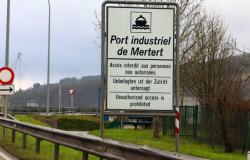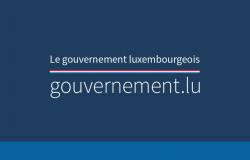
We have known since the accident at a lock in Müden that the transport of goods on the Moselle is at a standstill, probably until March 2025. “I was here for the last time in May, everything was still in order . In November we celebrated another anniversary, and now this,” breathed Mobility Minister Yuriko Backes (DP) during Tuesday’s press conference at the port of Mertert. The accident and its consequences are exceptional and require rapid solutions. The aim is to maintain supply chains and address logistical challenges.
The accident has caused significant delays: around 70 ships are waiting to continue their journey. A temporary solution now allows restricted passage, but processing is slow. “It’s about unloading the ships on the Moselle and getting them moving again,” explained Yuriko Backes. Despite initial progress, the situation remains tense.
“There is no reason for consumers to worry”
The Moselle is an essential transport route for Luxembourg, particularly for the transport of bulk goods such as petroleum products, construction materials and waste. “We now see how important the Moselle is for Luxembourg,” underlined Gilles Braquet, general manager of Luxport, the operator of the site.
The Minister of Economy, Lex Delles (DP), tried to allay the concerns of the population: “20% of petroleum products are located here in the port, and there are strategic depots in other places in the country . There is no reason to worry.” There is also no reason to fear an increase in prices for consumers.
Trains and trucks
In order to circumvent the blockage, the transport of goods is increasingly transferred to other modes of transport. “Part of what we need to do is move to rail,” Ms. Backes said. Companies like Tanklux are working, in collaboration with the CFL and Belgian partners, to set up additional trains.
Road transport is also involved, but winter represents an additional challenge. “When it snows, no truck can drive,” explained Daniel Bollaert, director of Tanklux. Despite the efforts made, the pressure is enormous to find solutions.
Three companies requested partial unemployment
The economic consequences are palpable: three companies, including the port of Mertert and transport companies, have already filed requests for partial unemployment. “Given the exceptional situation, companies can also submit their requests during the month, which is not normally possible,” explained Lex Delles. Other companies could follow if the effects are prolonged.
The crisis clearly shows the importance of sustainable infrastructure. “We need to ensure that a second lock chamber is installed. Such a situation must be avoided, as we are now seeing the consequences,” Ms Backes said. The cost of a second lock chamber is estimated at €120 million, an investment which Ms Backes said would pay off in the long term. Luxembourg also plans to request European co-financing.
Are you already following us on WhatsApp?
Subscribe to our channel, activate the little ???? and you will receive a news recap every day in early evening.





